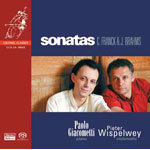
Cello Sonatas
 $43.00
Out of Stock
$43.00
Out of Stock6+ weeks add to cart
FRANCK / BRAHMS
Cello Sonatas
Pieter Wispelwey (violoncello) Paolo Giacometti (piano)
[ Channel Classics SACD / SACD ]
Release Date: Monday 28 July 2003
This item is currently out of stock. It may take 6 or more weeks to obtain from when you place your order as this is a specialist product.
On Hybrid Super Audio CD (SACD) format, presented in full 5.1 surround sound! PLAYABLE ON ANY CD SYSTEM
SACD release
However successful, overwhelming and moving the other movements of the two sonatas on this CD may be, here I will restrict myself to the two opening movements which are indisputably 'hors catégorie', as the French say. Of course it's all very hard to put into words, but I'll try to explain how I see them. If I would acclaim their originality, genius and complete mastery or praise their combination of beauty, perfection and wealth of psychology and emotion, most people would agree with that, be it with indifference and right they are. Confronted with such creations all description is doomed to stuttering and stumbling, every compliment will remain a pityful molehill compared to the mountain which is the object of our admiration. Nevertheless I'll carry on if you don't mind. There is an intriguing similarity between the two movements which I want to draw your attention to. I admit their outer appearances differ unmistakably: Franck's Allegretto is an associative poem, partly meditative, partly visionary (the piano solos), with extremely refined harmony which continuously causes the most subtle of mood changes. The other a sonata movement with a symphonic ring, a lyrical universe in which everything finds a melodic expression. The Franck may have something wagnerian about it and the Brahms may be anything but teutonic, still one couldn't say they meet in the middle. But no matter how unique each of them is, they have something in common. It took me a while before I could put my finger on it. First I thought it was the natural completeness and authority of both, the vulnerability of the content and the superior execution or simply the fact that both contain beautiful, primarily lyrical music. Then I realised something else. Both pieces kept giving me the impression of being typical products of muse interference or less enigmatically, of unusually rich inspiration. Whereby obviously, I am not referring to anything spiritual nor to a real life muse, but purely to inspiration in the classical (and literal) sense, a classical muse so to speak. I know inspiration isn't enough, a brilliant execution is crucial, but somehow the traces of conception of ideas seem to be everywhere, not least in the abundance of melodic invention. After that I began to see what I had vaguely felt from the outset. As already said, both men seemed 'touched', as if motives, parts of melodies and harmonies had been presented to them, however sickeningly romantic that may sound. Or put in other words, they must at some point have realised how beautiful the result of their work promised to become. Contemplating this it became evident to me that from that moment on they must have been entering a state of euphoria. Maybe even ecstacy, surely gratitude and a bit of pride, but above all they must have felt euphoria over their creative powers. It was only then that I could name the origin of what I unconsciously had heard as the underlying tone of serenity, which now fully revealed its defining significance to me. It was this trust of a never yielding imagination that enabled the music to unfold so blissfully. Blessed is the composer who is so richly bestowed upon. No need to express one's own pain, not even one's own fortune. The music can unselfishly sing and narrate, not in an uninvolved way, but on the contrary, with lots of empathy and sensitivity. With a serene vision, not dreamily serene but lucid and sensually serene. That in the end seemed to be what I felt they shared, this extraordinary mix of generosity, emotionality and serenity which sets them apart, hors catégorie. Unbelievable music, unbelievable inspiration…. Pieter Wispelwey
